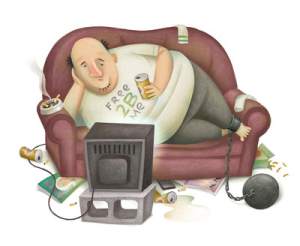Addiction
I received a tortured call one evening. “Horrible things are happening, my life is coming unraveled,” the caller said, spilling out a litany of disasters that tangled financial loss, physical illness, family estrangement, and psychological despair.
“Your addiction is catching up with you,” I said. The dialog between the two of us had been protracted, painful and interspersed with angry telephone clicks when my frankness offended him. Now he wept brokenly.
“I know.”
“You must get help.”
“But I’d have to spend all my savings to go into rehab! Plus I’d have to tell people the truth! What would they think of me? And I can’t leave my job.”
“You’ll lose it all anyway if you don’t get help—money, loved ones, job. It’s your choice; leave it now for a time or lose it forever.”
He reminded me of captain afraid to leave his sinking ship, willing to ignore the sound of water rushing into the hull.
“Why can’t I just stay here and quit?” he asked.
“It happens sometimes,” I said, “but most of the time addicts must leave their environment to escape the triggers. Plus they must have the help of others.”
“Can’t I just pray?”
“Sure, go for it. But that’s what you did last week.”
I believe in prayer. I’ve known a few cases where people recovered from serious addiction without any human intervention. But most of the time a drastic change of environment is necessary, partly to help the addict realize their desperate condition. One of the markers of addiction is minimization; the addict underestimates the problem. He believes he can “quit anytime,” or cut back when things get “out of hand.” Most of the time, the addiction keeps him in the dark. Searing moments of realization come with consequences, only to be quenched again by the lie that everything is under control.
Under control is right, but not the way the addict thinks. The addiction has control of him, not the other way around. Paul said, “Do you not know that to whom you present yourselves slaves to obey, you are that one’s slaves whom you obey?” (Romans 6:16) He uses sarcasm here to make his point. When you give up your freedom, you lose your freedom. Duh.
And for this Jesus died? So that His children, His precious, image-bearing children, His fearfully, wonderfully made children, could riddle their brains and bodies with a soul-destroying poison or practice? Is this why He tasted death for everyone? So they could then drink, smoke, sex, and drug themselves to death all over again?
“I don’t matter,” you may say, “I’m a loser, I’m nothing, I’m worthless.” Momentary thrills and self-sabotage seem logical if we believe this. But God determines our value, which is equal with His Son. “He who did not spare His own Son, but delivered Him up for us all, how shall He not with Him also freely give us all things?” (Romans 8:32) God could not have more forcefully declared our value; He gave His prized, precious, adored Son. Don’t you dare tell me you’re worthless.
We don’t belong to ourselves, so have no real right to destroy ourselves. We’re God’s property and self-destruction violates Him. Protect God’s child from the enemy, even when the child is you and the enemy is you. In other words, protect you from you.
Avoid addiction like the plague. Don’t use anything habit forming: alcohol, tobacco, caffeine, drugs, junk food, illicit sex, godless media. Use moderately what is good: food, exercise, social life, buying, recreation.
If you’re already addicted, agonize to enter the straight gate and do whatever it takes to free yourself. Go to Jesus as you are and tell Him you’re powerless. Pray for His guidance through the labyrinthine options of the mental health system. Get counsel from someone who has helped others. Get help from friends and loved ones. Seek anointing and special prayer from spiritual guardians. Most of all, cast yourself upon the mercy of the One who valued you enough to die for you. Amen.

